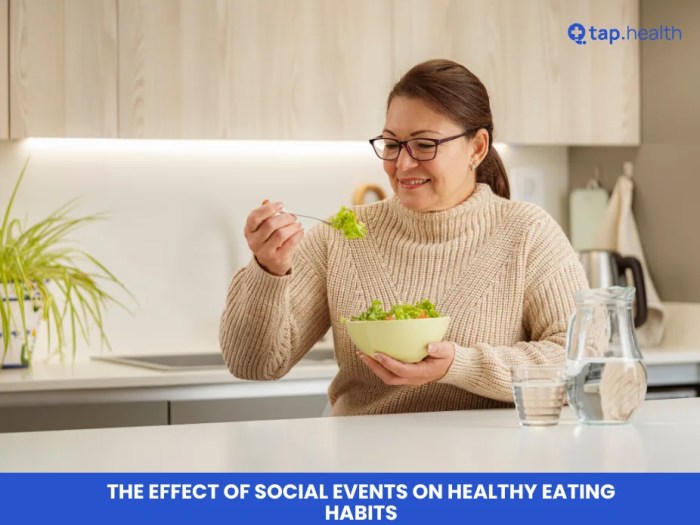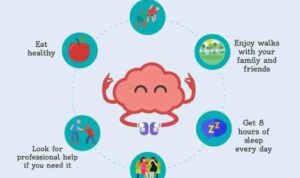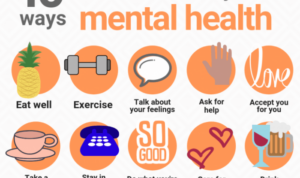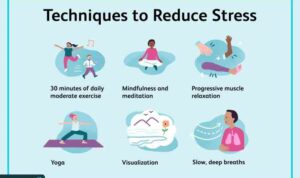Healthy Eating Habits are key to a vibrant lifestyle. Dive into this guide packed with tips and insights on nourishing your body and mind.
Explore the benefits, components, and tips for fostering healthy eating habits for a more balanced and energized life.
Benefits of Healthy Eating Habits

Eating a balanced diet is crucial for maintaining good health. It provides the body with the necessary nutrients, vitamins, and minerals to function properly and stay strong.
Overall Well-being
Healthy eating habits contribute significantly to our overall well-being. When we fuel our bodies with nutritious foods, we feel more energized, focused, and less prone to illnesses.
Physical and Mental Health
Good nutrition plays a key role in both physical and mental health. A diet rich in fruits, vegetables, whole grains, and lean proteins can help prevent chronic diseases like heart disease, diabetes, and obesity. It also supports brain function and can improve mood and mental clarity.
Components of a Healthy Diet
Eating a balanced diet is essential for maintaining good health and overall well-being. A healthy diet consists of a variety of food groups that provide the necessary nutrients for the body to function properly.
Key Food Groups for a Balanced Diet
- Fruits: Fruits are rich in vitamins, minerals, and antioxidants that help boost the immune system and support overall health.
- Vegetables: Vegetables are packed with essential nutrients like fiber, vitamins, and minerals that are vital for good health.
- Protein: Protein is crucial for building and repairing tissues in the body, and sources include lean meats, poultry, fish, beans, and nuts.
- Carbohydrates: Carbohydrates are the body’s main source of energy and can be found in foods like whole grains, fruits, and vegetables.
- Fats: Healthy fats are important for brain function, hormone production, and overall health. Sources include avocados, nuts, seeds, and olive oil.
Tips for Developing Healthy Eating Habits
Eating healthy is not just about what you eat, but also how you plan, prepare, and consume your meals. Here are some strategies to help you develop healthy eating habits:
Meal Planning and Preparation
- Set aside time each week to plan your meals and snacks.
- Make a grocery list based on your meal plan to avoid impulse purchases.
- Prep ingredients ahead of time to make cooking easier during the week.
- Cook in batches and store leftovers for quick and healthy meals on busy days.
Mindful Eating Practices and Portion Control
- Eat slowly and savor each bite to better recognize when you are full.
- Avoid distractions like watching TV or using your phone while eating.
- Use smaller plates and bowls to help control portion sizes.
- Listen to your body’s hunger and fullness cues to avoid overeating.
Incorporating Whole Foods and Reducing Processed Foods
- Choose whole grains like brown rice, quinoa, and oats over refined grains.
- Include a variety of fruits and vegetables in your meals for added nutrients.
- Opt for lean proteins like poultry, fish, beans, and nuts instead of processed meats.
- Limit sugary drinks and snacks, and choose natural sweeteners like fruits instead.
Effects of Poor Eating Habits: Healthy Eating Habits

Eating unhealthy foods high in sugar and salt can have detrimental effects on our bodies, leading to various health issues and chronic diseases.
Negative Impact of Excessive Sugar and Salt Consumption
Excessive consumption of sugar and salt can contribute to weight gain, high blood pressure, and an increased risk of heart disease. Sugar-laden foods and drinks can also lead to tooth decay and insulin resistance, while high salt intake can cause water retention and kidney problems.
Unhealthy Eating and Chronic Diseases, Healthy Eating Habits
Poor eating habits, such as regularly consuming processed foods and sugary snacks, can increase the risk of developing chronic diseases like diabetes and obesity. These conditions can have long-term consequences on overall health and well-being if not addressed through a balanced diet and lifestyle changes.
Connection Between Poor Nutrition and Low Energy Levels
A diet lacking essential nutrients and vitamins can result in low energy levels, fatigue, and reduced productivity. When the body does not receive proper nourishment, it struggles to function optimally, leading to feelings of tiredness and sluggishness throughout the day.




